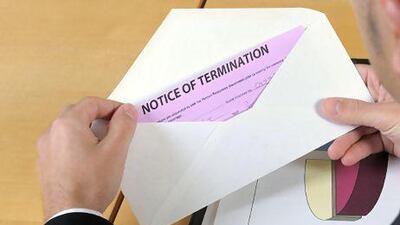The National's resident consumer advocate Keren Bobker answers questions on contract termination and retirement.
I have been working for a private company in Abu Dhabi with an unlimited contract for more than three years. On January 31 I was made redundant, effective immediately, but with one month's notice and pay. My physical last working day was also January 31. Concerning final payment: is my effective last working day January 31 or February 28? To which day should my leave and end of service gratuity payments be calculated from? KR, Abu Dhabi
In this case KR is entitled to be given 30 day's notice of redundancy and even if he is not required to work during this time, he remained effectively employed. This means that his last working day will be February 28 and his end of service gratuity is calculated as of that date too. Any leave entitlement not taken is also payable and cannot be assumed to be taken during the 30 days' notice period.
I am shortly to retire so I am trying to track down some UK pensions from many years ago, but cannot find any records so hope you can help. One is from a company that no longer exists where I worked from early 1973 to the start of 1975. I have no paperwork and the company must have closed many years ago as I cannot find anything on the internet. Although I wasn't there that long, I remember paying into a pension. After all this time it must be worth something so I don't want to lose out. What can you suggest? WC, Dubai
If you left your job before April 1975 the situation depended upon the rules of that particular scheme. In most cases, if you paid into the scheme you would have received a refund of your pension contributions only. If you did not pay into the scheme, you may not be entitled to receive anything except possibly in the case of redundancy. Some schemes did grant members an entitlement to a preserved (deferred) pension, payable from retirement age, provided that they had completed a certain number of years, and in order to claim a pension a member should have a certificate of entitlement to benefit or a letter from the scheme administrator. This would have been provided at the date of leaving and will give details of any entitlement. If you do not have this, then it is most unlikely that you will be able to prove your claim. The other options are to try to track down colleagues from that time to see if they have any records of what happened to the company or what happened to the pension scheme, or you can contact Companies House (the Cardiff office) to see if they have any leads to track down the pension scheme administrators.
I have a question about UK tax. I moved to Abu Dhabi in September 2012, but the job has not worked out and I will be leaving in a few weeks' time to return to the UK. Do I need to stay until the end of the UK tax year to avoid paying tax on what I have been paid? My work will finish on March 7, but I can stay here a bit longer if it helps. PD, Abu Dhabi
As you will have been out of the UK for less than a full tax year (April 6 to April 5) you will remain a UK resident for tax purposes for all the time you have been in the UAE. This means you will be subject to UK income tax, at your marginal rate on all of your earnings from April 6, 2012 to April 5, 2013, both from the UK and also all income earned in the UAE. A person needs to be UK non-resident for at least one full tax year, minus a permitted number of days of visiting the UK, to be considered exempt from paying UK income tax, even on overseas income.
I have been residing in Abu Dhabi since 1980 with my family. My daughter, aged 23, is a student at a medical university in Pakistan. She has a valid UAE residence visa under my sponsorship. Because of her intensive studies and final exams, she has overstayed in Pakistan (by more than six months) and now she intends to come to the UAE. I am afraid that due to her overstay out of the UAE she may not be allowed to enter. Is there any exemption for female university students; if so what procedure is to be adopted to obtain approval/exemption for her entry as a special case? IM, Abu Dhabi
A residency visa expires if someone is outside the UAE for 180 days. This is not the same as cancellation and someone cannot then enter on a visit visa. The residency visa must be cancelled before a new visa can be issued. Generally an employer, or in this case M as the sponsor, must deal with this. A visit to the UAE Immigration Department is required and there will be fees in the region of Dh300. An original passport is preferred, but a good quality copy is usually acceptable. Once this has been dealt with a new visa can be applied for.
Keren Bobker is an independent financial adviser with Holborn Assets in Dubai. Write to her at keren@holbornassets.com with queries for this column or for advice on any other financial planning matters

